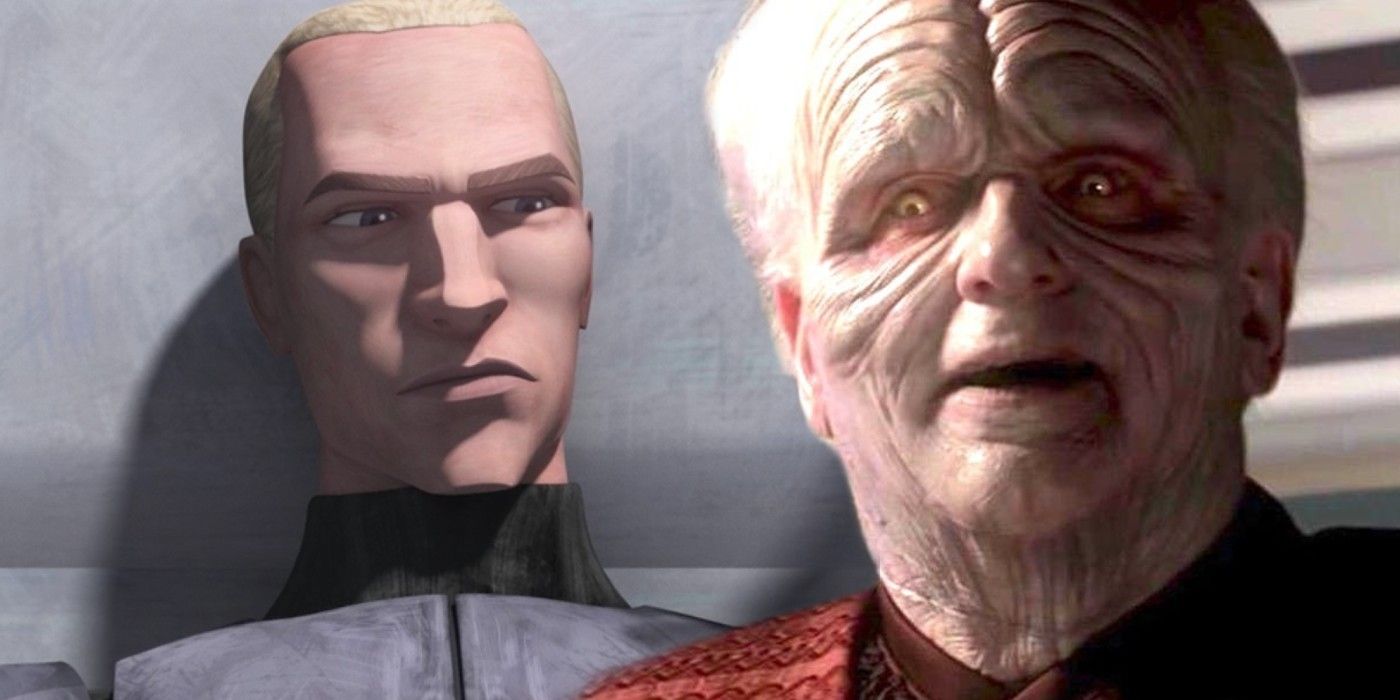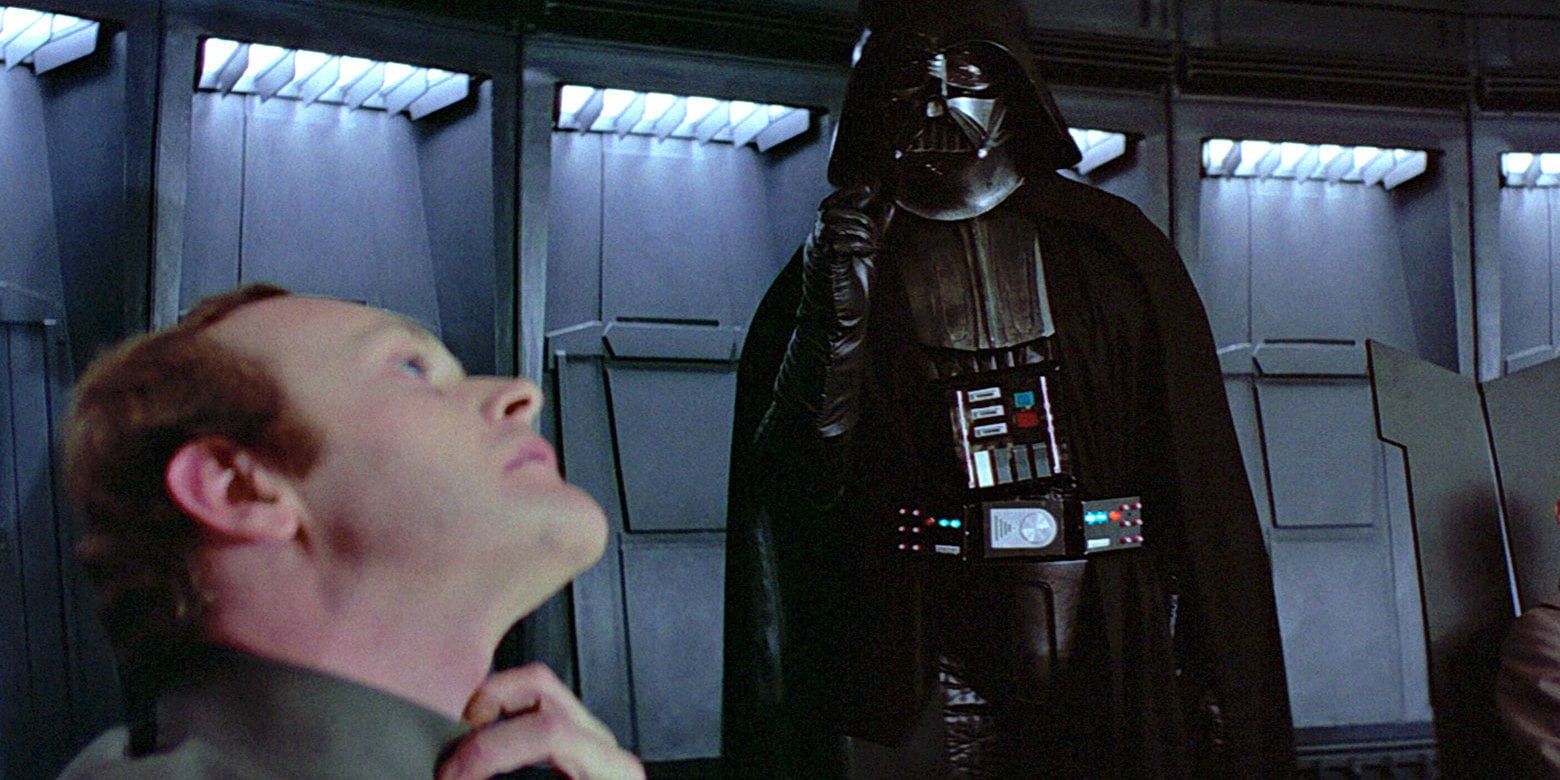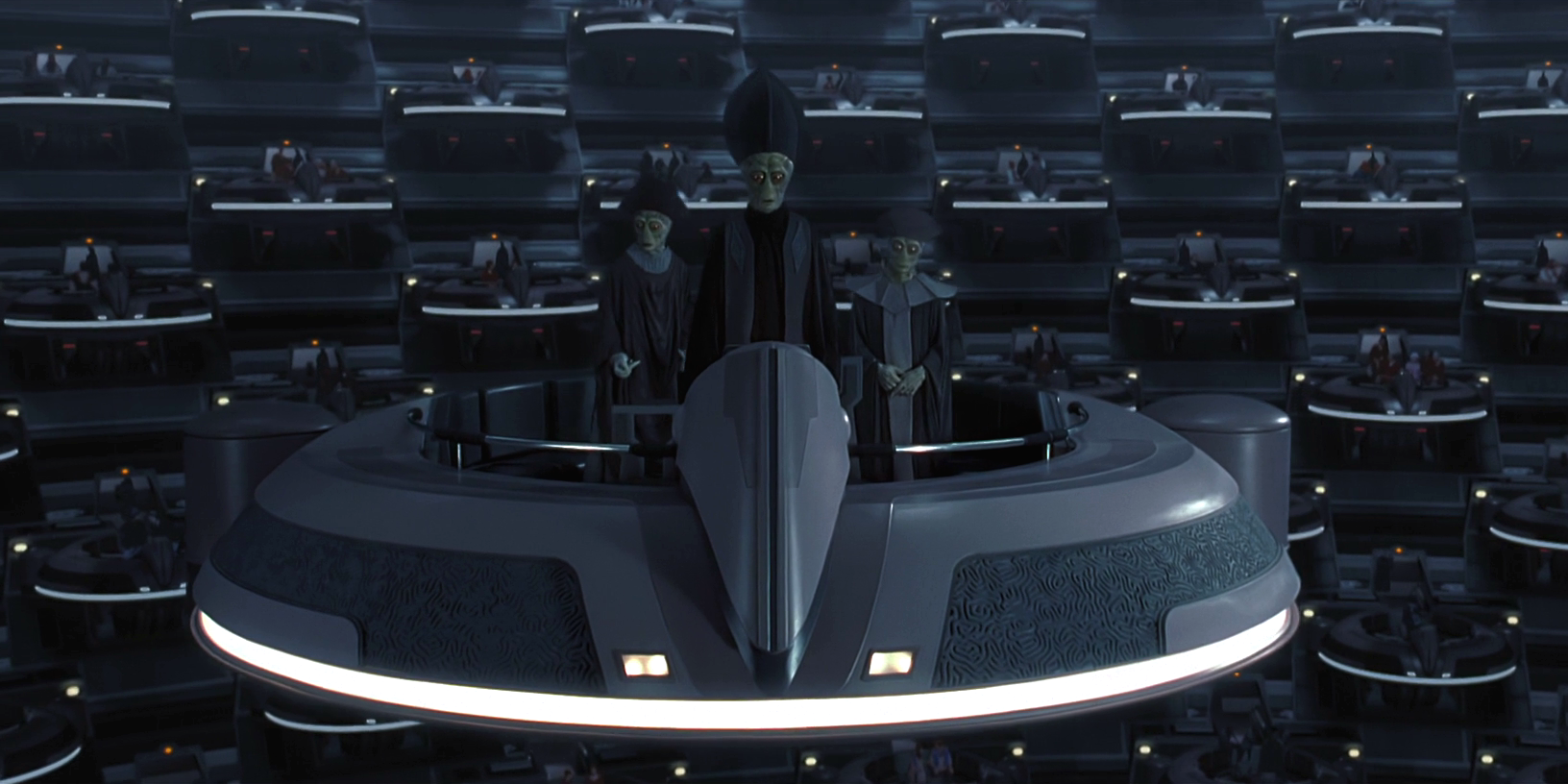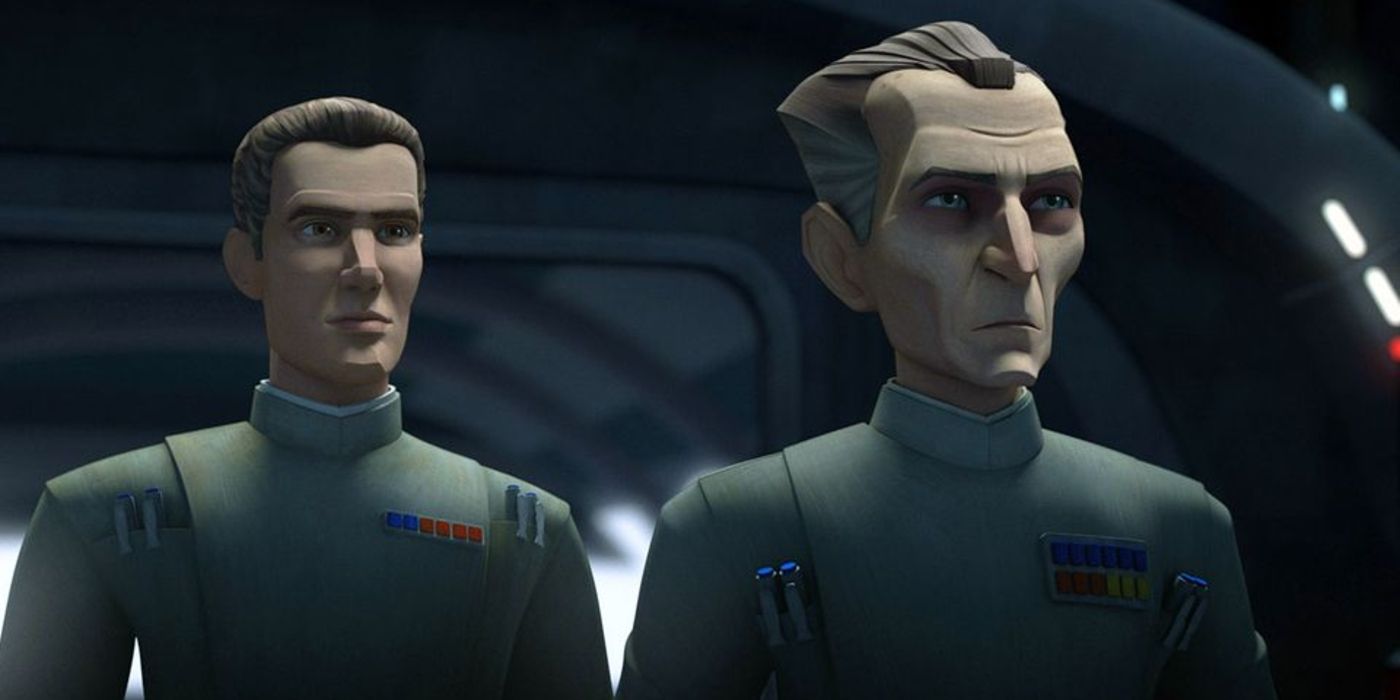The Empire will always be a great source of evil in the Star Wars timeline, but modern canon is depicting its rise in a more nuanced - albeit no less sinister - light. Science fiction tales are, at their core, struggles between darkness and light, and Star Wars takes that concept more literally than most. On one hand there's the Jedi, monk-like knights defending peace and justice in the galaxy; on the other, the Sith, tyrannical, power-hungry menaces who would enslave and corrupt those weaker than themselves. Most citizens in the Star Wars universe have no idea this battle is actually happening - they only see an ongoing conflict between Rebellion and Empire.
Sheev Palpatine was already a fully-paid member of the Sith club when he wheedled his way into the Galactic Republic's political sphere, long before the era of the Star Wars prequel trilogy. Palpatine played a masterful long game and successfully replaced the existing Republic with his own Empire, marking the start of a wholesale dictatorship in the Star Wars galaxy.
A long time ago, in theaters not so far away, Star Wars depicted the Empire in a relatively one-dimensional light, leaving no doubt as to its moral alignment. But from the Star Wars prequels to Star Wars: The Bad Batch, there's a clear discrepancy between what Palpatine's pernicious pals used to be, and what they are now.
Star Wars Originally Showed The Empire As Absolute Evil
Within the opening minutes of 1977's Star Wars, the Empire has blown up a planet, captured a princess in a space lair, and choked a staff member for raising a perfectly valid concern. Barbecuing Luke Skywalker's aunt and uncle completes the full house of bad guy bingo. George Lucas makes a concerted effort to establish how awful the Empire is from the very start, and at no point during the initial trio of films does that missive change. After a horrifying introduction, the Empire remains a reliable source of terror and menace, oppressing innocent citizens, conspiring with gangsters, and killing literal teddy bears. Entirely by design, the Star Wars villains have no redeeming features, and those that do (Anakin Skywalker eventually comes round) only earn that redemption by turning their back on the Empire.
In the same vein, the Rebellion is presented as wholly good - a plucky bunch of underdogs fighting for freedom against a seemingly insurmountable enemy. They're the polar opposite of Palpatine's Empire. The original Star Wars trilogy offers virtually no information on the regime before the Empire, but leaves the impression that those heralded years were a veritable paradise compared to the iron-like grip of Palpatine's wrinkly fist. In short, Republic good; Empire bad, and no room for maneuver.
This principle largely continues into the Star Wars prequel trilogy. When the Empire is fully formed in Revenge of the Sith, the occasion is celebrated with the culling of the Jedi Order, a chilling proclamation, and a classic maniacal "nooooooooo" from Darth Vader. Most gravely of all, Palpatine's manipulations indirectly result in sweet, innocent, "are you an angel?" Padmé losing the will to live. Utterly despicable.
But the Star Wars prequels did introduce a new facet to the franchise's moral duality - the idea that the Galactic Republic was a little bit rubbish. Although Palpatine's fingerprints are everywhere, the Emperor's ascension to Supreme Chancellor is caused by the Senate's inability to prevent the Trade Federation attacking Naboo. Swimming in bureaucracy and ineptitude, the Galactic Republic's failings gave Palpatine a route to power - and this is a revelation Star Wars would later explore in greater detail.
Star Wars Canon Is Showing How Much The Republic Failed
Since that first narrative seed was sown by The Phantom Menace, Star Wars has continued to highlight the failings of the Republic. The Empire didn't ruthlessly seize control of a peaceful galaxy, as the original trilogy led us to believe. Instead, many citizens welcomed the change of regime, though they remained blissfully unaware of the gory truth behind Palpatine's rise.
Star Wars: The Clone Wars was first to tug on this morally gray thread. Across the course of the titular conflict, Jedi and clone forces would be prevented from aiding certain planets or populations due to the impossibly dense tangle of bureaucracy between Republic Senate, Jedi Council, and corrupt bureaucrats. On Mandalore, for example, ancient Republic treaties meant Satine Kryze's people didn't receive help when it was most urgently needed. The problem is clearest from the perspective of Ahsoka Tano, who routinely does the "right" thing, but has no grasp on the galaxy's politics, and finds herself in hot water as a result.
Star Wars' output on the big screen followed suit, in particular with the double-header of 2016's Rogue One and 2017's The Last Jedi. Set shortly prior to the original trilogy, Rogue One proves the Rebellion wasn't as squeaky-clean as Star Wars once suggested. The intelligence agent Cassian Andor is secretly given instructions to assassinate Galen Erso, a prisoner of the Empire, and while he doesn't carry out the order, he does sacrifice an ally to a Stormtrooper patrol, allowing himself to escape. Then, in The Last Jedi, a code-breaker by the name of DJ highlights the hypocrisy of the Resistance to a stunned Finn and Rose, claiming both sides buy their weapons from the same sources. Canto Bight also reveals poorly treated child stable workers, which the New Republic has apparently overlooked.
The Mandalorian goes even further in suggesting the line between Empire and New Republic isn't especially well-defined. Many in The Mandalorian's era view the New Republic as a joke - a powerless, ineffectual replacement unable to restore order to a galaxy in chaos. The Empire's absence allowed private corporations to enslave the working classes of Tatooine, and New Republic ranger Carson Teva later argues that the fledgling regime is trying its darnedest to mop up the mess of the Empire, but struggling desperately. Din Djarin's adventures make plain that many planets liberated from Imperial control, were immediately plunged into a new predicament under the New Republic.
Star Wars: The Bad Batch is now examining the early stages of the Empire's foundation and, sure enough, all the hallmarks of a fascist regime are present, from the categorization of citizens under chain codes, to the merciless pursuit of so-called rebels. The relentless cloning operation on Kamino is morally dubious in itself. Breeding frontline fodder for profit can never be the most wholesome way to make a living, and not only did the Republic allow it to happen, it was Kamino's biggest customer. Furthermore, not everyone is sad to see a changing of the guard when the Republic falls. A fresh Stormtrooper recruit utters to his comrades, "with the Empire I get paid, I get fed, I have a roof over my head... that's more than the Republic ever did for me." No doubt these sentiments are echoed by countless other Stormtroopers, spotlighting abject poverty as another weakness of the Republic.
Star Wars Is Changing How You View The Empire
In contrast to the old "Republic good; Empire bad" mantra, recent Star Wars canon proves that, for many, there's little difference between them in practice. Is the political maneuvering and deep-rooted corruption of the Republic significantly preferable to Palpatine's unelected, unchecked authority? Is willfully turning a blind eye to slavery acceptable, so long as someone else is doing the actual enslaving? From a certain point of view, the Empire is actually doing more to protect citizens (so long as they fall in line). The Bad Batch's Stormtroopers may not be getting a living wage and full employee health benefits, but they seem happier with their lot now Palpatine is calling the shots.
This is more a damning indictment of the Republic's failings than justification for the Empire's tyranny, and despite Star Wars' newfound disdain for the pre-Palpatine regime, the Empire remains a byword for evil and darkness. The aforementioned Stormtrooper, happy to be receiving a paycheck, soon discovers that in exchange for minimum wage (presumably), he'd have to slaughter innocent families, or otherwise be killed himself. And as much as the Empire's unquestionable authority might've kept Tatooine in check, try telling the people of Alderaan that the Republic was no better.
The Empire is still unquestionably evil in Star Wars, and barring the most ridiculous of retcons, that will forever remain the case. But from the prequel trilogy to the modern day, Star Wars has gradually deconstructed the narrative that everything was rosy before (and after) the Empire took charge. Palpatine seized upon preexisting governmental flaws, invested in a more effective PR department, and posed as a viable alternative when change was sorely needed. Turns out that change just wasn't as dramatic as audiences assumed back in 1977.
Why Star Wars' Empire Change Is A Good Thing
Though there's no sign of it in the original trilogy, reframing the ethical alignment of the Empire is a positive move for the Star Wars franchise. As much as fans might question whether the political wrangling of The Phantom Menace was a worthwhile avenue to take, the storyline does at least demonstrate George Lucas realizing that a black-and-white, clear-cut depiction of the Empire and the Republic couldn't continue beyond three films. As Star Wars ventures deeper into TV shows and spinoffs, blurring the lines between good and evil is an effective method of evolving the original narrative into something more meaty for the future.
This updated, nuanced Empire also falls closer to real life, making for a much more interesting social commentary. Very rarely (if, indeed, at all) does an evil government materialize from the shadows and seize power from a healthy, functioning regime. Neither do tyrannical leaders implement all of their darkest designs right off the bat. History books will demonstrate that mankind's most vicious rulers took advantage of an already bleak situation and promised to make things better. Initially, they'd do exactly that, and only after their influence became absolute would their true awfulness come to the fore. Thanks to the likes of The Mandalorian and The Bad Batch, Star Wars' Empire now reflects that grim reality far more accurately.





